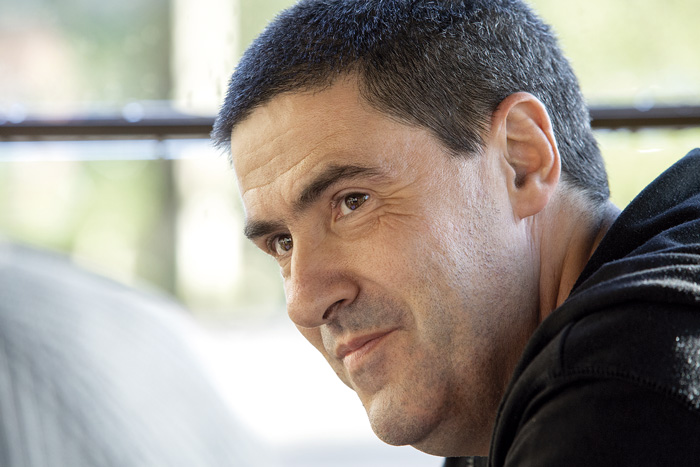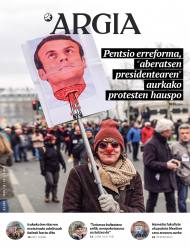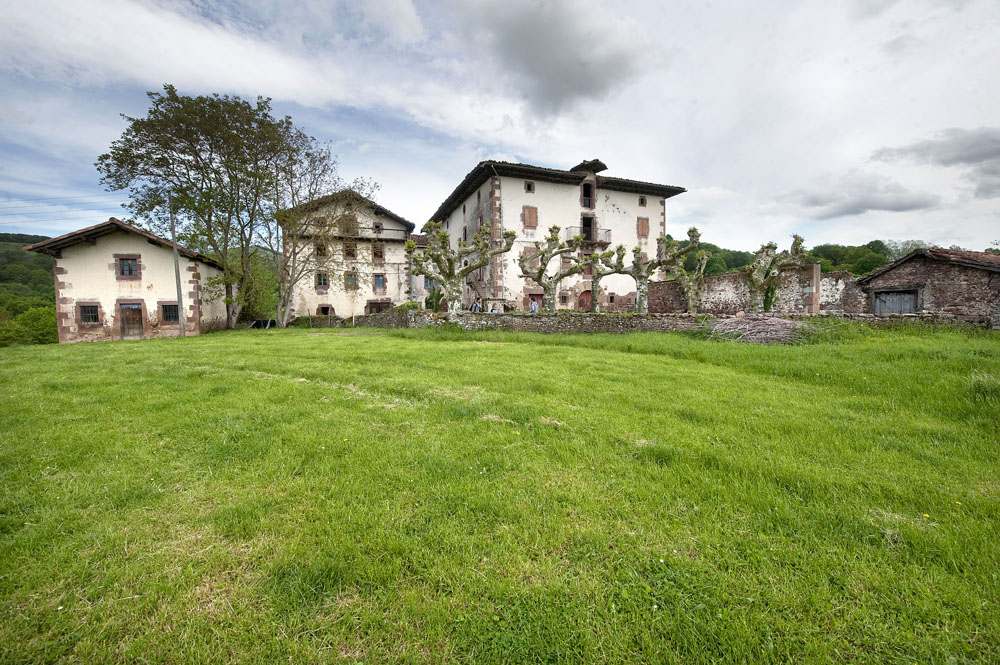"I think there's a cultural industry, but it's not mine."
- We met in Durango with the writer zornotzarra (Durango, 1969). He's an atypical writer. He's an industrial worker, he works in metallurgy. He's written a lot of black novels and stories. He has his hands as the genre of his books: darkness. His latest work is the book of stories Zorioneko family (Elkar). At the same time, he has just won the Gabriel Aresti competition, on behalf of the judge.

It has been published as a writer for 20 years and has been devoted to metallurgy for 30 years. What has it contributed to being an industrial worker when writing?
A writer has to reflect or show his environment, and that being has given me the opportunity to know many contexts of working workers and families. I've probably included themes and people in my books based on them. The workshop gives me an “extraordinary context.” My books would be different if I had an office job.
Workers of the metal of Bizkaia have reached a pre-agreement, among them the writer Iñaki Irasizabal…
That's right. Last week we went on strike and today too (we interviewed it on 29 November) it was called. The call has been suspended by the pre-agreement. Petitions are fair and I am also fighting with my colleagues.
As a writer, how do your peers see you?
As a curiosity, but with respect.
The Durango Fair, for example, what is it for you?
I usually don't go to the Durango Fair. I'm still out. It's true, I'm a part of it, my books are there, they're sold, but I go a little further, that world doesn't attract me, I say it with respect, I think there's a cultural industry, but it's not mine.
According to Teresa Larrea (could be the pseudonym of Xabier Mendiguren, editor of the book) the structures of your novels follow those of Thriller, but crime and mystery are nothing but love. Is your real intention to portray society?
The core of my novels or stories is to make a black portrait of society. However, the gender designation does not comply with me. I always want to tell a good story, narrated as I can. Everything else is secondary to me. I mean, if it's a story, and I can tell it in ten pages, I won't write the novel, and it won't be black. The gender designation is an excuse, a means. I don't feel attached to a gender. In the background the genres are limits, the denomination of gender limits you and the black genus even more.
What is a black novel for you?
It's a story that has crime, it's its central axis, and it's a portrait of society. But for example, the thread of the novel doesn't have to bother to invent the murderer, if the important thing is to know who the murderer is, for me it's not black, it's from the police. I make that distinction. I'm not interested in the police genre, those novels are closer to math than literature.
You've written a lot and the criticism has heeded you. How did the criticism deal with you?
Most criticisms don't get my books right. Critics, in general, have treated me badly, my books are not to the liking of Basque criticism.
"To me, the writer 'tormented' is a stereotype of writer. It's a label to sell or honor a 'cursed' writer, a pedantic label."
You've been awarded multiple times. You have recently won the Gabriel Aresti Prize on behalf of Epaila through the story. What do you think of literary awards?
Prizes have two advantages: they give you money, because our literary system gives you very little money, and they also feed you your ego. At least someone tells you that what you're doing is valid. I presented three stories to the Gabriel Aresti Prize, wrote them for the book of the family of happiness, but they were too many to get into the book and I was left out. Otherwise, I am not presenting myself to the awards. And here's what I've been given the grand prize. At most I expected an accésit. Still the third one, you receive 1,700 euros. It's no small thing.
Do you need the ego to write?
Not only to write, but also to live. The truth is that my writer is no longer big, my place in literature is not extraordinary, not as a person; however, I find it motivating to sell books or receive some prize.
Some of your stories are set in the post-political transition era, in the late 1980s.
Because the first world I ever met is when I was 7-10 years old. The landscape of the first world you know is very present in life, also the person, who I – as you said – was at the end of the 1980s. The time and people of that age are strongly attracted to you, some stereotypes are left to you forever, some characters are constantly appearing in your memory. A couple of stories belong to that time, but not all.
The time that follows ETA is today. Has change influenced your job as a writer?
Yes, of course. Firstly, because it affects the whole of society. But the change has not only been since ETA disappeared. In the history of ETA, there were different times. It is not the same to set up a novel in the Basque Country in the 1960s, 70s, 80s or 90s, in all those times the evolution of society was constant. For example, in the 1970s, the crisis was brutal, I think stronger than it was today. What we live in this decade is hard, but today society receives more economic support. A lot of people in the 1970s went through a very harsh situation, stayed in the street. Industrial reconversion was huge, subsidies were not the current ones. Of course, the current change has been tremendous. The subtraction of ETA has had a great influence on society due to the phenomenon of globalization.
The literature of the future will be different. Has the charm been lost?
Yes, yes -- there will be charms. Society has changed and it's going to change even more, but to know what kind of stereotypes they're going to be or what kind of thing they're going to be charming about. Or what will be lovely… In the next 30 years will be other taboos that do not exist today. I am, however, optimistic. I do not believe that society has worsened, but that it is gradually improving. I think we're better now than we were when we were born.
What was the time when we met?
Today you can write things that you couldn't write. That is, it takes the distance to write about various facts and themes, not only for the society surrounding ETA, but also for the society on the other side. In the last 60 years, society has changed radically, which is very evident in education. The writer has to constantly focus on changing people's character.
In the stories of the lucky family, there are no heroes.
The narrative that I like is conflict, conflict revolves around history, conflict and, for example, people catch or incomplete. These characters give you more opportunities to be more credible. If someone does everything right, if they play with common sense, there is no story, there is no novel, there is no film… Storytelling has to be something with uncertainty. Stupid characters make storytelling easier. That intention has to do with the black novel, the characters always have some defect, or a discomfort with others, something that generates conflict. If there is no conflict, there is nothing to tell. If the family is happy, it starts and ends in two rows, it can't weave a hundred pages. Irony or sarcasm is necessary, of course, the title of my last book has to be read in that sense.
Family: nest of love, pillar of society, tool of mutual help, parenting and protection of the elderly. Family: the temple of hypocrisy, the hole of lies, the deposit of hatreds, the school of rigidity…
That's right. It's a good and bad family at the same time. In the literature, the characteristics of the family are appropriate for the meaning: everyone belongs to the family or part of it, but all are different. The family offers you plenty of contrasts and opportunities. It's used a lot in storytelling.
Your form of storytelling sometimes falls into the painful narrative.
It can be. I'm looking for a little bit of tenderness to make the narratives interesting. Character development brings me to tenderness. As a reader, I like these kinds of books, rather than looking at the main argument, I like to complete the narrative with details and little trivialities.
A critic says that the reader will not find a social critique in the book.
I think the critic meant that “one of the stories was meant to make a social critique.” Well, no. If that was my intention, I would write the essay, or a blog. My goal is to tell stories well. My books are not particularly aimed at social criticism, either those of now or those of the past. I want to create a good story, create complex characters, full of nuances, social critique is not my task. In my novels, sometimes, you can recognize the footprint of social critique, but it's been shown in an involuntary way. Not at all in the stories. The characters in my books are flawed, they live in social conflicts, they've known the economic crisis and drug addiction, but despite that, I don't want to make a social critique.
.jpg)
Did you stay at ease with the book cover?
Yes. The editor had another idea, to put the traditional American family in a position, with the broken photo... The illustrator said that this idea was very clear and I found this very good. The phrase from my father's ash pot is very good: “The father always in our mind.” You always think of my father, but everybody laughs.
Society has changed a lot and also the way we deal with death. Death is very present in your texts.
Yes, because we all live conditioned by death. My father's death often appears in my books. But that's fiction. In our life, real death, it hides, the situation of death has changed a lot. Imagine, when my grandfather was dying, they took me by the hand to him, he was six years old. That is not being done today. If you do, the child will not sleep, so you should be taken to the psychologist.
According to William Douglass [anthropologist] in his works, in Aulesti (Bizkaia), when someone died, the children were put on the front line of the evening. The children prayed next to the cure. The cultural change that has taken place in a century is enormous, and not only around death. Today, the media influence society more than death. Of course, that influences the literature.
The creator cannot bear reality. The writer also has to create a parallel world to live. That is not the case. You live dedicated to the work of the factory, the industry...
In principle, I do not agree with this premise. The human being is a storyteller, loves play and play, Gizakia Homo ludens is playful monkey. Human beings have always told stories, and even today – in all cultures – they like to tell and tell good, stimulating stories. Writers do it or try it ... For me, the tormented writer is a stereotype of writer. It is a label to sell the cursed writer or to gain prestige, a pedantic label. The writers I know are normal, they lead a normalized and comfortable life. They don't live under a bridge. I don't know any of that.
Hilaren 24tik 30era bitartean egingo dute aurtengo (H)ilbeltza, Baztango nobela beltzaren astea. Aurtengo programazioa aurkezteko spota argitaratu dute asteazken honetan.
Aurten ez dute nobela beltzaren asterik izan Baztanen, (H)ilbeltzaren antolatzaileek urtean zehar sakabanatu baitituzte jarduerak. Asteartean jakinarazi dutenez, baina, 2022an berriz egingo dute astebeteko (H)ilbeltza jaialdia.
(H)Ilbeltza Euskal Nobela Beltzaren Asteak aurtengo edizioa iragartzeko spot-a argitaratu du urteko bigarren egunean. Beltz kutsukoa da iragarkia eta, noski, krimen baten berri ematen digu.
Ernesto Prat Urzainik Telleria eta gero, zer? aurkeztu du maiatzaren 17an Elkar argitaletxearen eskutik, bere hirugarren eleberria.
Baztango Udalak eta Txalaparta argitaletxeak euskarazko literatura beltza sustatzeko beka jarri dute martxan. 6.000 euroko laguntza dago mahai gainean, zeina kutsu beltzeko euskal nobela-proiektu onenaren egileak poltsikoratuko duen. “Nik idatziko nuke, baina ez dakit zer... [+]
(H)ilbeltza elkarteak, Baztango Udalak eta Txalaparta argitaletxeak aurkeztu dute deialdia, eta lanak ekainaren 23ra arte bidal daitezke.











ilbeltza-(1).jpg)












